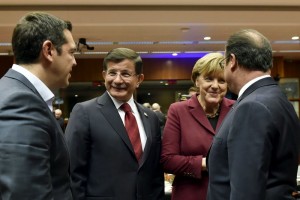Amid the deepening migration crisis, the European Union (EU) has sealed a pact with Turkey to stop the flow of illegal migrants to Europe. As a part of the deal, Turkey and Greece will start working together to prevent illegal immigration into Europe via the Aegean Sea, one of the main routes for illegal immigrants. According to a statement issued by the EU, the sides agreed that all new irregular migrants crossing from Turkey into Greece will be sent back to Turkey if their asylum is rejected, starting from March 20. In return for every Syrian returning to Turkey from Greece, another Syrian will be resettled from Turkey to the EU.
The deal has become controversial as it amounts to virtually sending all illegal immigrants back to Turkey from the Greek islands. It is estimated that around 72,000 Syrian migrants living in Turkey would be settled in the EU under the agreement. More than a million migrants and refugees have entered the EU by boat from Turkey to Greece.
Turkey’s EU ambitions
The latest deal may be interpreted by some as Turkey staging a comeback in European politics, but, more realistically, it underlines the fact that it has re-energised its relationship with EU. Many European politicians were skeptical about the pact, but eventually the realities of the refugee crisis prevailed, with France’s President Francois Hollande and Germany’s Chancellor Angela Merkel driving the pact. “I have no illusions that what we agreed today will be accompanied by further setbacks. There are big legal challenges that we must now overcome,” Ms Merkel said after the deal was signed.
As per the UNHCR’s understanding, people seeking international protection will have an individual interview on whether their claim can be assessed in Greece, and the right to appeal before he or she is sent back to Turkey. This would also ensure that once returned, people in need of international protection will be given the chance to seek and effectively access protection in Turkey.
With the latest development, Turkey is likely to press for fresh talks over its EU membership. The EU has also promised to expedite the disbursement of 3 billion euro, which aims at helping Syrian refugees in Turkey. “At a time when Turkey is hosting three million, those who are unable to find space for a handful of refugees, who in the middle of Europe keep these innocents in shameful conditions, must first look at themselves,” Turkey’s President Recep Tayyip Erdogan said.
Highlights
- All “irregular migrants” crossing from Turkey into Greece from 20 March will be sent back. Each arrival will be scrutinized by the Greek authorities.
- As per the agreement, for each migrant returned to Turkey, a Syrian migrant will be resettled in the EU. Major priority will be given to those who have not tried to illegally enter the EU and the number is capped at 72,000.
- The deal states that Turkish nationals should have access to the Schengen passport-free zone by June. This will not apply to non-Schengen countries like Britain.
Author Profile
- India Writes Network (www.indiawrites.org) is an emerging think tank and a media-publishing company focused on international affairs & the India Story. Centre for Global India Insights is the research arm of India Writes Network. To subscribe to India and the World, write to editor@indiawrites.org. A venture of TGII Media Private Limited, a leading media, publishing and consultancy company, IWN has carved a niche for balanced and exhaustive reporting and analysis of international affairs. Eminent personalities, politicians, diplomats, authors, strategy gurus and news-makers have contributed to India Writes Network, as also “India and the World,” a magazine focused on global affairs.
Latest entries
 DiplomacyJanuary 5, 2026India walks diplomatic tightrope over US operation in Venezuela
DiplomacyJanuary 5, 2026India walks diplomatic tightrope over US operation in Venezuela India and the WorldNovember 26, 2025G20@20: Africa’s Moment – The Once and Future World Order
India and the WorldNovember 26, 2025G20@20: Africa’s Moment – The Once and Future World Order DiplomacyOctober 4, 2025UNGA Resolution 2758 Must Not Be Distorted, One-China Principle Brooks No Challenge
DiplomacyOctober 4, 2025UNGA Resolution 2758 Must Not Be Distorted, One-China Principle Brooks No Challenge India and the WorldJuly 26, 2025MPs, diplomats laud Operation Sindoor, call for national unity to combat Pakistan-sponsored terror
India and the WorldJuly 26, 2025MPs, diplomats laud Operation Sindoor, call for national unity to combat Pakistan-sponsored terror








